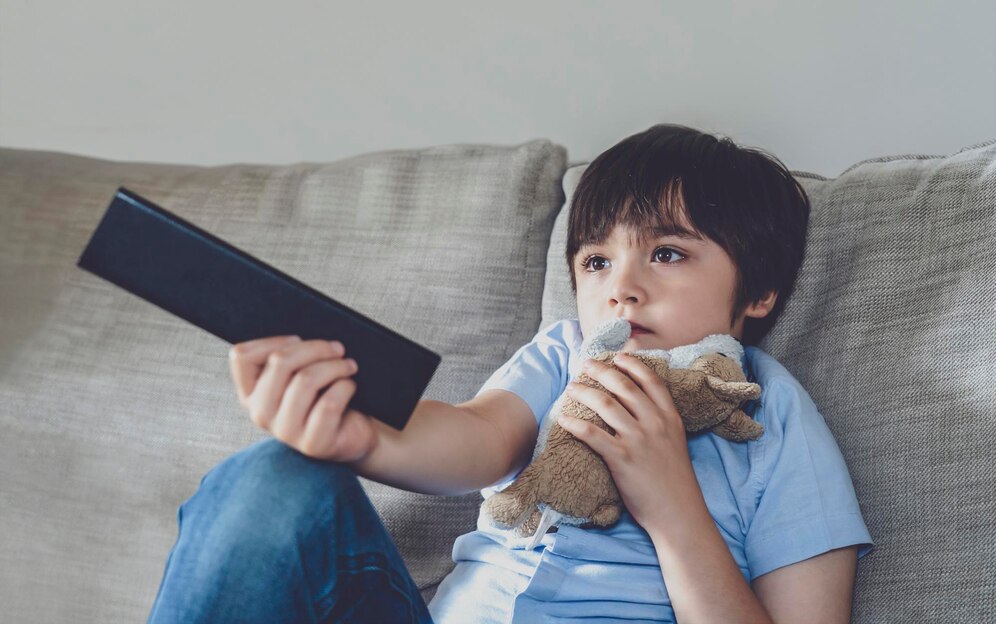From the very start, I found myself questioning certain approaches—especially how we handle children’s emotions and trust. Even before I actively started learning about parenting, I knew that breaking old patterns in parenting was necessary. Some common tactics never felt right to me.
Growing up, I noticed things like calling a child over by pretending to have a hidden treat, distracting them with false promises, or scaring them into obedience with made-up threats like “Jin baba aa jae ga.” And then there’s the classic trick of taking a child to the doctor, reassuring them it’s “just a check-up,” only to get them vaccinated, pretending later as if nothing happened.
These approaches always felt wrong to me. If our closest relationships—especially with our parents—are built on small lies, doesn’t that slowly erode a child’s trust? Aren’t we unconsciously teaching them that lying is acceptable if it helps in the moment?

As I stepped into motherhood, I realized that breaking old parenting patterns meant unlearning these habits—not just in others but in myself. I started actively working on changing the way I set boundaries, discipline, and connect with my child. It’s not always easy, and I’m still learning, but the goal remains the same: to parent with honesty, respect, and consistency.
In this blog, I’ll be sharing how I’ve navigated these challenges in my own parenting journey—breaking old patterns in parenting, setting boundaries without guilt, and staying consistent without using fear. Over time, I’ve realized that discipline isn’t about control but guidance and that trust is built in everyday moments. These are the lessons I’ve learned, the changes I’ve made, and the ones I’m still working on.
Choosing Honesty
When I became a parent, I decided that I wouldn’t use these shortcuts. I made a conscious effort to be honest with my children—even when it was inconvenient. If I was busy, instead of distracting them with false promises, I’d simply say, “Mama is working right now. Let me finish, and then I’ll listen to you.” If I was going to the market, I’d say, “I need to buy some things, and I’ll show you what I got when I return.” If something wasn’t meant for them, I’d tell them, “This is a personal item, and it’s not for you to play with.”
Of course, young children don’t always understand these explanations fully, but I believe this builds trust over time. They learn that when Mama says something, she means it. And that trust is invaluable.
Setting Boundaries
When I first started exploring parenting strategies, I had a few misconceptions. One of them was that gentle parenting meant avoiding all discipline, which didn’t sit right with me. Over time, I realized that being gentle doesn’t mean being permissive.
Children need boundaries—but boundaries don’t have to come with fear or punishment. You can be strict without being harsh. Setting consequences is different from yelling or using fear-based discipline.
If screen time is over and they resist, instead of abruptly turning off the screen, I give them a countdown: “10 minutes left,” then “5 minutes,” then “3 minutes.” When it’s time to turn it off, I make them part of the process by saying, “Okay, let’s count together—10, 9, 8…3, 2, 1, and off!” This way, they are mentally prepared for the transition, reducing resistance and frustration.

Consistency in Boundaries
Discipline isn’t just about transitions like screen time—it’s about staying consistent with everyday boundaries. One of my biggest parenting challenges has been sticking to limits without guilt. I won’t pretend I never lose patience—there are moments when I do raise my voice. But I am learning that discipline doesn’t have to mean control; it’s about guidance.
For example, my son loves watching Leo the Truck, and at one point, it became a daily demand. At first, I struggled—how do I stay firm without a meltdown? Eventually, I introduced a simple rule—cartoons are only for Saturdays.
The change wasn’t instant. There were protests. For me, the challenge was staying consistent, even on tough days. For him, waiting an entire week felt unfair at first. But instead of just denying him, I shifted his focus: “Let’s make food with pretend toys! Let’s build a helicopter with blocks!”
It took time, but eventually, he learned to anticipate cartoon days rather than expect them daily. This experience reinforced an important lesson—when limits are consistent, they become a natural part of a child’s routine rather than a constant battle.

Validating Emotions
Another important realization I had was how often we unintentionally dismiss children’s emotions. For example, if a child brings a broken toy to us while we’re busy, it’s easy to say, “Just leave it, we’ll get another one,” or “It’s okay, toys break all the time.” But in that moment, what they hear is that their feelings don’t matter.
Instead, I’ve learned to take such moments as opportunities to teach empathy and resilience. When my child comes to me with a broken toy, I acknowledge their feelings first: “Oh no, your toy broke! That must be upsetting.” If I’m occupied with something urgent, like cooking, I calmly let them know, “Give me five minutes, and then I’ll take a look.”
This not only validates their emotions but also teaches patience and understanding—that sometimes, even when someone loves you, they might not be immediately available.
When I finally get to their toy, even if it’s beyond repair, I still show them that their concerns matter: “Let’s see if we can fix it. Hmm, it looks tricky, but we tried! Sometimes things break, and that’s part of life. Maybe we can find another way to play with it?” This way, they learn that while disappointments happen, we acknowledge their feelings, and they have the strength to move on.

Quality Time Over Quantity
One thing I strongly believe in is quality time. Many of us get caught up in the idea that we need to spend endless hours with our kids. While time matters, what’s more important is how that time is spent.
Even 30 minutes to an hour of undistracted, fully present time can be more valuable than spending hours together while being mentally absent. During this time, there should be no phones, no random conversations with others—just pure engagement. Whether it’s pretend play, puzzles, or storytelling, that time should make your child feel valued.
Another thing I consciously avoid is using screens as a default distraction. When I’m doing household work, I prefer keeping my kids close rather than sending them off with a toy or a device. Yes, having kids around in the kitchen can be challenging, but I’ve found that instead of shielding them from everything, teaching them safety and awareness works better.
Parenting is a Work in Progress—Breaking Old Patterns
Parenting is not about perfection—it’s about progress. I am still learning, adapting, and improving. Some days are harder than others, but breaking old patterns in parenting has shown me that small, conscious changes make a big difference in the long run.
These were just a few flashbacks from my parenting journey—moments that shaped my perspective and approach. I’ve shared my experiences here, but parenting is an ongoing learning process.
I also wrote a blog on Positive Parenting, where I explored this approach in more detail. You can read it here: https://zenmotherhoods.com/positive-parenting-a-journey-to-mindful-connection/.
Now, I’d love to hear from you! What’s a parenting moment that changed your perspective? Share your experience in the comments—I’d love to learn from you too! 😊



